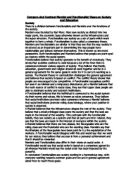Later in the 1950’s another functionalist, Parsons, conducted his own study and argued that the family only performed two key functions that could not be provided by any other institution. They are primary socialisation- teaching children the basic norms and values of society. This ensures value consensus is maintained. This is when everyone in society shares the same values. And stabilisation of adult personalities- the family provides stability and emotional security, taking away the stresses of everyday life. It is also known as the ‘warm bath theory’ because like a warm bath it eases away the worries and strains.
However Marxists would disagree with both Murdock and Parsons and Suggest that functionalists only look at the good points of the family and have an idealised view on the family. Murdock ignores family diversity and Parsons ignores variation in the family such as different ethnic groups view on the family. The founder of Marxism is Karl Marx who based Marxism around capitalism and said that in order for the country to become communist, the proletariat (working class) would have to overthrow the bourgeoisie (ruling class).
Unlike functionalists, Marxists do not agree with value consensus and the promise of meritocracy. From a Marxist point of view society operates largely for the benefit of the bourgeoisie. This makes the family a very pivotal institution and it forms part of the superstructure so is therefore responsible for passing on bourgeoisie norms, values and beliefs. Marxists say that the family purpose is to maintain the position of the bourgeoisie so it is like a prop for capitalism. Marxist, Engels, did a study in 1972. He believed that the monogamous nuclear family developed in order to ensure property inheritance was being passed on to the true heirs. Husbands needed more control over their wives so there would be not doubt over the paternity of their offspring. The monogamous family was the most efficient way for this purpose. Zaretsky, another Marxist conducted his study in 1976 and concluded that the family was the key ingredient for capitalism as the family consumes the products of capitalism which then enables the bourgeoisie to keep profits up and allows the capitalist system to continue.
Both functionalists and Marxists look at the family from a macro perspective and therefore do not look closely at the effects on the individual. They believe that the reproduction of children and teaching of norms and values are important to keep society going. Murdock’s idea of a sexual function agrees with Engels’ point of monogamous nuclear families because they both agree that there should only be one sexual relationship and this is to be between the adults in the family. Functionalists and Marxists tend to focus largely on the nuclear family and ignore other types such as the extended family and single parent family. They also similarly blame any problems in the family on the capitalist system as this is suggested by both Zaretsky- claims the family is there to keep the bourgeoisie in place, and Parsons- whose warm bath theory talks of releasing the stresses of working in a capitalist society on their wives.
Functionalism and Marxism differ from each other in the sense that functionalists see family as a type of support whereas Marxists focuses mainly on the family’s role in society. They do not see the relationships of some families i.e. Parsons’ warm bath theory, as important as its place in keeping the bourgeoisies profits up.
Where functionalism has been criticised for ignoring conflict within the family and assuming that family life is a safe haven for everyone. It can also be said that Marxists are too deterministic as they exaggerate the importance of the economic system on family structures.
Although the two theories are very opposite to each other, as functionalism gives a positive view on the family and Marxism is quite negative about the family. Both are fairly dated considering the changes within the family and the rise of alternative types of household.
An alternative perspective on the family that would criticise both Marxism and functionalism is feminism. Feminists would arguer that the two do not discuss the effects of family life on women. The feminist study looks at other areas of family life like domestic violence and housework. They also challenge traditional views of male dominance in the family. Feminism is a micro study as it focuses more on the affects families can have on women as individuals.








